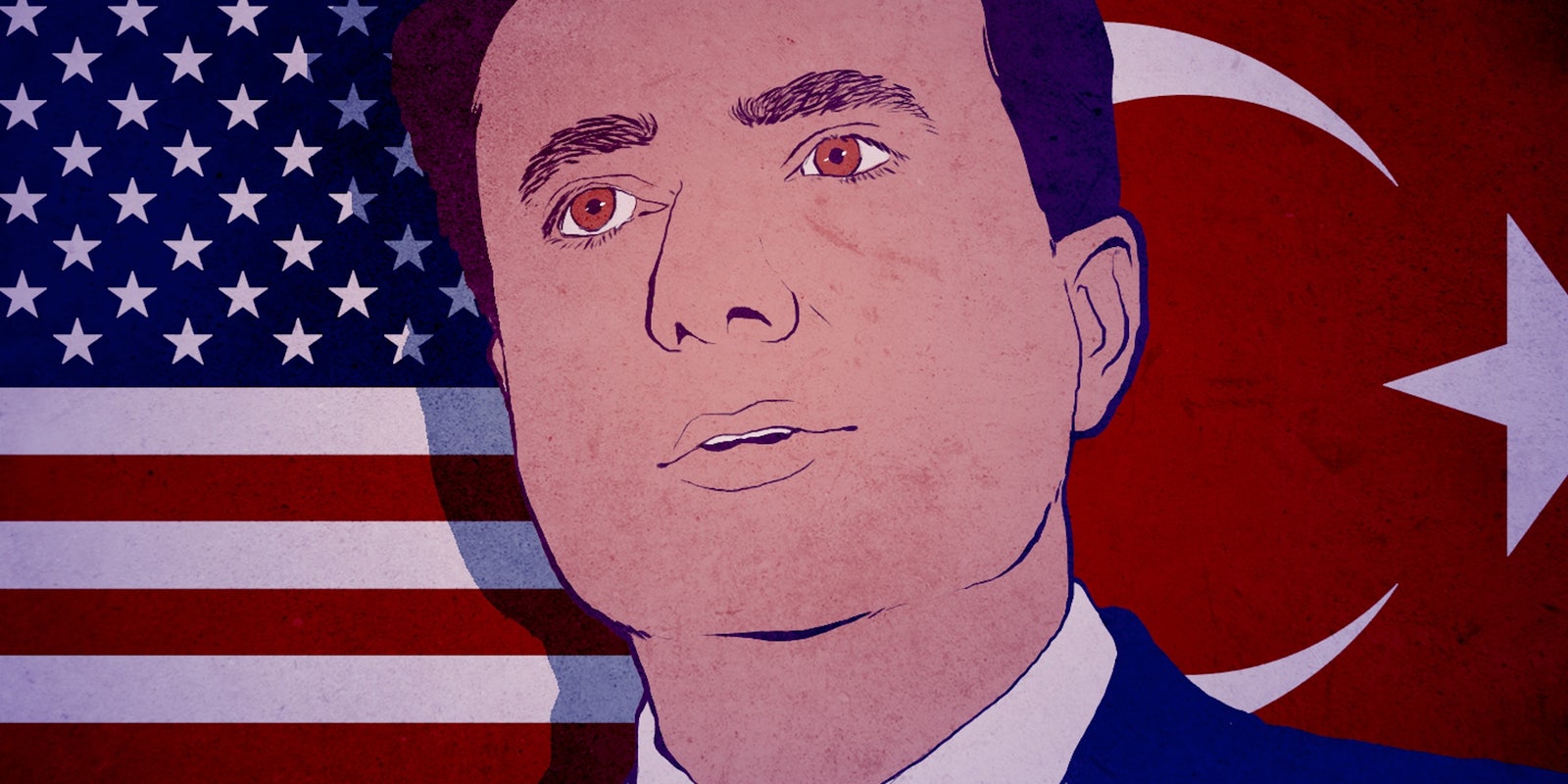U.S. Attorney Preet Bharara, who became famous online as the prosecutor who convicted Ross Ulbricht as the kingpin behind infamous Dark Net market Silk Road, earned a quarter million Turkish followers on Twitter last week after he publicly announced the arrest of Reza Zarrab, the central figure in a 2013 corruption scandal that reaches into the highest echelons of Turkey’s government.
Reza Zarrab to soon face American justice in a Manhattan courtroom. @SDNYnews https://t.co/5S3c1oaWVO
— US Attorney Bharara (@USAttyBharara) March 22, 2016
Charges Bharara’s office at the Southern District of New York brought against Zarrab, an Iranian-Turkish businessman and recipient of the “2015’s top exporter award” in Turkey, include conspiring to evade U.S. sanctions against Iran, money laundering, and bank fraud, according to the U.S. Department of Justice.
The 21-page indictment, U.S.A. v. Reza Zarrab et al., provides bank transactions and email correspondence as evidences of fraud and alleges that Zarrab’s companies in Turkey and United Arab Emirates acted as fronts for Iranian companies and entities blacklisted by the U.S. government. Simply put, Zarrab and his co-conspirators are accused of laundering gold and goods for Iranian oil and gas, via complex financial transactions that involve Chinese banks and gold dealers in Dubai.
While Bharara has become a rising celebrity in Turkey, his office’s indictment of Zarrab places him in stark contrast to the country’s most famous figure, Turkish President Recep Tayyip Erdoğan.
The late 2013 Turkish investigation on the Zarrab network was mainly about the graft, or “commission,” distributed to Turkish ministers in order to get government’s help in boosting gold exports from Turkey. Zarrab was briefly jailed with sons of three cabinet ministers, but Erdoğan was quick to suppress the investigation. The prosecutors of the case were suspended, thousands of police officers from organized-crime and financial-crime units, including the police chief of Istanbul, were either sacked or transferred. All corruption charges were eventually dropped by the new prosecutors and even the money confiscated from the houses of the alleged graft ring members was returned. Then CEO of Halkbank, a public bank where Iran has a gold account, had the largest cache of money in his house; same Halkbank was hit again by a significant loss last week following the arrest of Zarrab in the U.S..
While the foreign investors are closely following the case, the general Turkish population cannot, because news of Zarrab’s arrest has largely been ignored by the Turkish mainstream media. A general gag order was issued by the government on the graft probe in 2014, a journalist reporting on corruption has been fired, and remaining news articles have been censored by defamation lawsuits ever since.
Most recently, 21 online outlets that reported about Erdoğan’s connection to the U.S. indictment of Zarrab were banned by a Turkish court at the request of Erdoğan’s son, Bilal Erdoğan.
Feyzi Isbasaran, a former MP of the Justice and Development Party (AKP), said on Twitter that Zarrab knowingly traveled to the U.S. to cut a deal for protection, escaping a mafia hit in Turkey or the death penalty in Iran—a fate to which his alleged Iranian partner, Babak Zanjani, was recently sentenced. Zarrab’s decision to waive a bail hearing, tweeted by Bharara, was taken as a sign that he may indeed ‘spill the beans’ to mitigate his sentence.
Reza Zarrab declines to seek bail in Florida court, to be transported to New York for further proceedings pic.twitter.com/WdxCIwUCVv
— US Attorney Bharara (@USAttyBharara) April 1, 2016
Erdoğan, who once praised Zarrab as a “philanthropist” and granted Turkish citizenship to his family on “exceptional grounds,” claimed Zarrab’s arrest “doesn’t concern Turkey” right before his five-day trip to the U.S. for the Nuclear Security Summit.
As foreign policy experts Merve Tahiroglu and Aykan Erdemir remarked, Erdoğan’s Washington trip, planned in a bid to repair strained relationships with the Obama administration, was already overshadowed by the arrest of Zarrab; but troubles followed. White House declined to have a formal meeting with Erdoğan, and his speech at the famous Brookings Institute was reported more for his bodyguards’ mistreatment of journalists than anything else. National Press Club expressed “alarm” regarding the abuse of journalists by his security detail and President Obama publicly criticized Erdoğan for Turkey’s crackdown on the press.
The indictment on Zarrab has so far not named any Turkish officials, but U.S. Treasury officials visited Turkey right after the Turkish investigation started, and the U.S. administration was aware of the “gas for gold” loophole that Turkey and Iran were exploiting—a loophole the U.S. closed in 2013. Although Erdoğan government’s alleged role in the illicit trade has never been made public, it reportedly harmed the trust between two allies.
The indictment of Zarrab is not the first time that Bharara sits at the center of strained international relations. He made headlines in 2011 when he got a Russian warlord, Viktor Bout, arrested in Thailand; in response, Russia put his name on a list of persons banned from entering the country, along with 18 other U.S. officials. His indictment of a Jamaican druglord, Christopher ‘Dudus’ Coke, had repercussions, according to the U.S. Embassy Cables released by WikiLeaks. And most recently, his team charged seven Iranian nationals for allegedly waging cyberattacks against dozens of U.S. banks and breaching control systems of a dam near New York City.
Bharara’s case against Turkey’s involvement in evading U.S. sanctions against Iran is already expanding. Regardless of whether they are reported by Turkey’s mainstream media, there is a cheerful audience in Turkey’s social media to read what he prosecutes. His support for freedom of speech and fair trial have higher standards than Turkey’s government, which regularly prosecutes citizens for what they say online. But nonetheless, Bharara’s scores of new Twitter followers from Turkey expect nothing less—that justice be served in a Manhattan courtroom when it cannot be served in Turkey.


